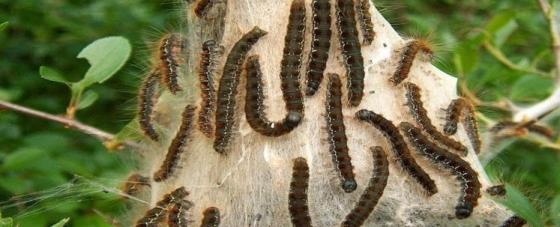Liberia: Armyworms Invade Bong County

The armyworms
…. As it leaves farmers with destroyed crops while also contaminating drinking water sources
Farmers in Zota and Jorquelleh Districts in Bong County are struggling to cope with an invasion of armyworms that has destroyed crops and contaminated drinking water sources.
The caterpillars, which march in large groups and feed on young plants, have wiped out entire fields. Maize, eggplants, pepper, cocoa, and cabbage are crops that are being heavily destroyed by worms.
The situation has halted agricultural activities across several towns and villages, leaving farmers helpless and unable to begin the new planting season for upland farms.
The farmers in Zota and Jorquelleh are claiming they fear the risk of being displaced as the warm weather continues to invade their dwelling places on a daily basis.
“It is so disheartening to watch as they watch helplessly and are unable to do anything,” the farmers said distressingly. “Farms and villages are being overrun by the army worms, and if nothing is done about it, we are going to encounter severe hardship as our farming season would be interrupted.
“Unless the spread of these worms is contained, food insecurity and malnutrition are likely to result, as affected towns and communities will not be able to carry out farming activities this year,” they added.
Armyworms are no strangers to Bong, mainly in Zota District. The last attack was in 2020, when armyworms struck and destroyed more than 2,000 hectares of crops in the district, leading to farmers spending huge amounts of money to fight them.
Some succeeded, while others lost their entire crops.
Charles King, a scientist at the Central Agricultural Research Institute (CARI), said in an interview at the time that planting the short-term crops gave the armyworms a longer lifespan as they found a host.
“Farmers should not have planted maize again after struggling with the pests for the better part of the year. The new maize crop became the host of the pests until this planting season,” King said.
Four years earlier in 2016, thousands of armyworms also invaded towns and villages in Zota which led to the destruction of crops, contamination of drinking water, and fleeing of residents.
Also, back in 2009, the district was hit hard by the worms, prompting then-President Ellen Johnson Sirleaf to make an urgent visit to the area to support the government’s swift intervention.
According to the Ministry of Agriculture, armyworms are migratory pests, with the adult pests having the capacity to fly over 30 kilometers while drifting through air currents. The pests are described as ferocious feeders that, upon invasion, quickly destroy crops.
The caterpillar feeds on the outer foliage making large and ragged holes. Attack on the crops at the early vegetative stage can result in 100 percent loss if no control measures are taken,” says the ministry in a note.
King, the CARI scientist, has claimed that genetically modified crops boost the fight against emerging armyworms, saying modified crops have the ability to resist worms.
Meanwhile, the Agriculture Coordinator for Bong County, Kollie Nah, has claimed that the Ministry of Agriculture is on the verge of dispatching a team to the district to solve the problem.
“The situation is very serious. It has affected most of our crops and farmland areas,” Nah said. “A majority of the farmers who are affected are small-scale farmers who produce more than 90 percent of their crops.
Nah noted that the outbreak poses a significant threat to smallholder farmers, mainly maize farmers, and is becoming a threat to food security in the county.
